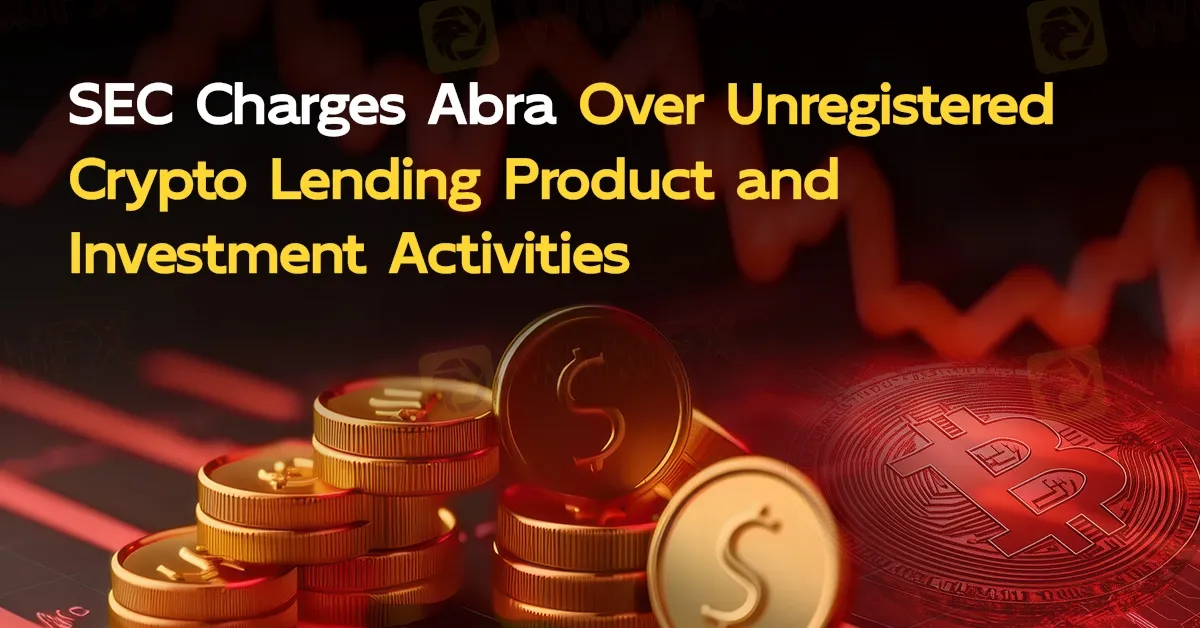简体中文
繁體中文
English
Pусский
日本語
ภาษาไทย
Tiếng Việt
Bahasa Indonesia
Español
हिन्दी
Filippiiniläinen
Français
Deutsch
Português
Türkçe
한국어
العربية
SEC Charges Abra Over Unregistered Crypto Lending Product and Investment Activities
Abstract:The Securities and Exchange Commission (SEC) has brought charges against Abra, a crypto asset platform operated by Plutus Lending LLC, for allegedly failing to register its retail crypto asset lending product, Abra Earn. The SEC's actions also include allegations that Abra operated as an unregistered investment company, raising significant concerns about investor protection and regulatory compliance within the crypto industry.

The Securities and Exchange Commission (SEC) has brought charges against Abra, a crypto asset platform operated by Plutus Lending LLC, for allegedly failing to register its retail crypto asset lending product, Abra Earn. The SEC's actions also include allegations that Abra operated as an unregistered investment company, raising significant concerns about investor protection and regulatory compliance within the crypto industry.
According to the SEC, Abra launched Abra Earn in July 2020, a program that allowed U.S. investors to lend their crypto assets in exchange for variable interest rates. This program gained substantial traction, eventually amassing $600 million in assets at its peak, nearly $500 million of which came from U.S. investors. The SEC has alleged that Abra marketed this program with promises of “auto-magically” earning interest, while retaining discretion over how to generate income from these assets. The SEC contends that Abra Earn constituted a security, which should have been registered in accordance with federal securities laws.
The SEC also highlighted that Abra held more than 40% of its total assets, excluding cash, in investment securities, including crypto asset loans to institutional borrowers. This level of investment in securities necessitated registration under the Investment Company Act of 1940, a requirement that Abra allegedly disregarded.

By June 2023, Abra had begun winding down its Abra Earn program, advising U.S.-based customers to withdraw their crypto assets. Despite this, the SEC proceeded with its charges, citing violations of both the Securities Act of 1933 and the Investment Company Act of 1940. In response to these charges, Abra has reportedly agreed to an injunction that prohibits further violations of the SEC's registration provisions. Additionally, the company will pay civil penalties, the amounts of which will be determined by the court. As part of the settlement, Abra has neither admitted nor denied the SEC's allegations.
The SEC's Office of Investor Education and Advocacy has previously issued bulletins warning investors about the risks associated with crypto asset interest-bearing accounts. These warnings emphasize the importance of due diligence in navigating the volatile crypto market, particularly when engaging with unregistered products or services.
This recent SEC action follows another legal challenge for Abra. In June 2023, Abra and its CEO, William Barhydt, settled with 25 state financial regulators in the U.S. for operating a crypto business without the necessary approvals. The platform was accused of offering crypto trading and investing services without proper licensing. As part of that settlement, Abra was ordered to return over $82.1 million in crypto assets to U.S. customers across the settling states and to cease its crypto activities in the region.
The ongoing legal issues surrounding Abra highlight the growing regulatory scrutiny faced by crypto platforms, as authorities seek to ensure compliance with established financial laws to protect investors and maintain market integrity.

Disclaimer:
The views in this article only represent the author's personal views, and do not constitute investment advice on this platform. This platform does not guarantee the accuracy, completeness and timeliness of the information in the article, and will not be liable for any loss caused by the use of or reliance on the information in the article.
Read more

Currency Fluctuations: What It Means When a Country's Currency Rises or Falls
When a country’s currency appreciates or depreciates in value, it reflects the underlying shifts in its economy and global market dynamics. For forex traders, understanding what drives these fluctuations—and how to strategically prepare for them—can make the difference between profit and loss in an ever-volatile market.

What Happened to NFTs?
The NFT market, once booming with speculative investment, has dramatically declined due to economic pressures, systemic failures, and fraud, but shows signs of evolving into a smaller, more stable niche supported by dedicated investors and emerging meme tokens.

OpenSea's Come back: Can a Revamped Platform Revitalise the NFT Giant?
OpenSea, once the dominant NFT marketplace, is launching a reimagined platform in December, aiming to reclaim its position in a market experiencing a steep drop in trading volumes.

Bitcoin.com Introduces Venmo for U.S. Bitcoin Purchases via MoonPay
Bitcoin.com now accepts Venmo for U.S. Bitcoin purchases, powered by MoonPay, enhancing ease and accessibility in the crypto world for millions of users.
WikiFX Broker
Latest News
How Sentiment Analysis Powers Winning Forex Trades in 2024
Capital One Faces Potential CFPB Action Over Savings Account Disclosures
Malaysian Woman's RM80,000 Investment Dream Turns into a Nightmare
Social Media Investment Scam Wipes Out RM450k Savings
FP Markets Received Three Major Awards
One article to understand the policy differences between Trump and Harris
M2FXMarkets Review 2024: Read Before You Trade
How can the forex fix be manipulated?
CMC Markets and ASB Bank Form Strategic Partnership
FX SmartBull Review! Read first, then Invest
Currency Calculator


